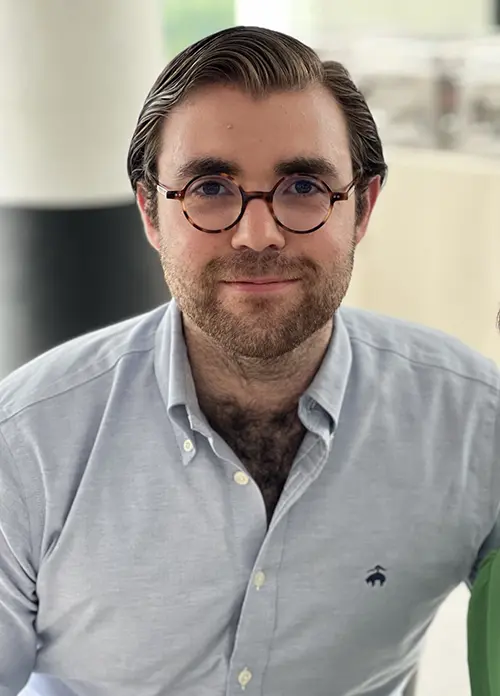Project Lazarus is a non-profit that provides housing, support, and resources for people living with HIV/AIDs in the greater New Orleans area. As part of their mission to heal and empower, the transitional living facility partners with local institutions and universities to offer wellness education opportunities for their residents. José Roberto González Bisteni is an MA candidate in Tulane’s Philosophy Department, and has been co-leading weekly classes at Project Lazarus since Fall of 2024. Additionally, three PhD candidates, Chen Wang, Craig Koch, and Daniel Stearman, co-teach the program alongside Bisteni.
By José Roberto González Bisteni (SLA ’25)
MA in Philosophy

Photo: José Roberto González Bisteni (SLA ’25)
Participants in the Project Lazarus program come from many walks of life. It is always interesting to see how they interpret topics presented in our weekly philosophy lessons, how they process thought experiments and philosophical arguments presented to them, and also to see them actively think about those problems in group discussions. The beautiful thing about philosophy is that no prior knowledge is needed. It is not necessarily what philosophy should "produce"; first comes thinking itself, and this is a possibility that we generally share as humans.
Starting in October 2024, I have been visiting Project Lazarus about once a week to co-teach philosophy lessons. The classroom has been rather informal — a kitchen table that fits 10 people comfortably. From the beginning, we found it to be the most suitable setting to discuss, question, and reflect.
The purpose of the lessons is to either introduce a philosophical problem or present the content of a philosophical text. Sometimes these two objectives overlap. For example, last semester Kant's philosophy was introduced to present both the problem of aesthetics and the problem of ethics. In the case of aesthetics, we detailed material from Kant's Critique of Judgement in order to explain why Kant thinks that judgements about beauty are subjective. In the case of ethics, we presented Kant's famous categorical imperative.
By looking specifically at one important text from the history of philosophy, we hope to show students the aspects involved within that area of philosophy. Furthermore, the lessons are meant to show a one-time student what philosophical questioning looks like; and for those students that continue to participate, to give a sense of what philosophy in general might be all about (this, of course, is itself a problem for philosophers).
This semester began with a paper that argues that philosophy has, as one of its ends, the living of a good life. In my own lessons, I have attempted to return to this problem, with attention to how it is that thinking can contribute to living life well. Perhaps it allows us to understand things better not only through the discarding of falsities, but also in highlighting how thinking done poorly can be dangerous and often indistinguishable from careful thinking, if one rushes to answers and does not stick with the problematic long enough. This line of thinking therefore does not blame philosophy for the existence of bad philosophies, but encourages the individual to constantly question instead of being contented with answers.
It is also worth mentioning that my co-teachers and I don't necessarily see eye to eye on all of these problematics, and are not always working within the same philosophical traditions. This gives the students multiple perspectives to consider: on philosophy, the ways of doing and thinking about philosophy, and on interpretations of these texts.
One student, who has attended nearly all of the lessons since I first arrived, has expressed his gratitude for our visits. In my view, he has gone from resisting the problems that we posed in favor of his preconceptions about philosophy, life, and politics, etc., to actively engaging with the lessons and finding ease with being confused over the problems, despite the headache that it causes (a trait that the Socrates of Plato's dialogues mentions is true of those first engaging with philosophy in more than one dialogue). Just this comfort in not knowing and the ability to be perplexed is, I believe, a great progress in developing oneself as a thinker (perplexity, as Plato's dialogues suggest, is the beginning of philosophy). These past two lessons, I have been very pleased to see more students show up and participate.
I thought these lessons would be a great opportunity for developing as a teacher and to get practice teaching philosophy in particular. I tend to struggle with feeling comfortable explaining things without being as precise as I possibly can, which might make my lessons more demanding for someone with no background in the area. In this regard, teaching at Project Lazarus was a great opportunity for learning how to respond to what is appropriate to the student's needs and desired outcomes, given that everyone is at a beginner level and being introduced to these concepts for the first time. However, I am constantly encouraged by the participation of the students, by the sense one gets that they are getting something from the lessons, and that they appreciate our being there. No one is there who does not want to be there, and this makes for a very gratifying time.

The Project Lazarus Transitional Living Facility, pictured here along with a view of one of its gardens, was founded in 1985.

